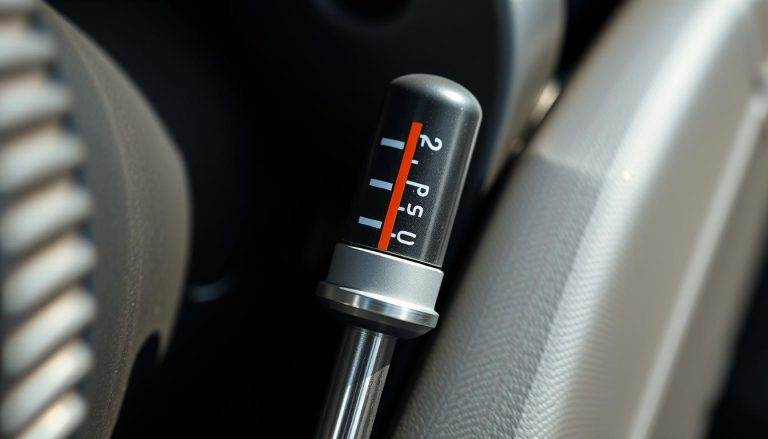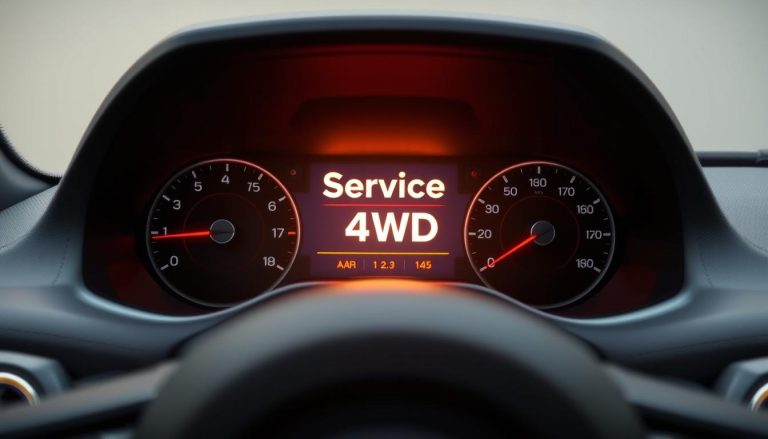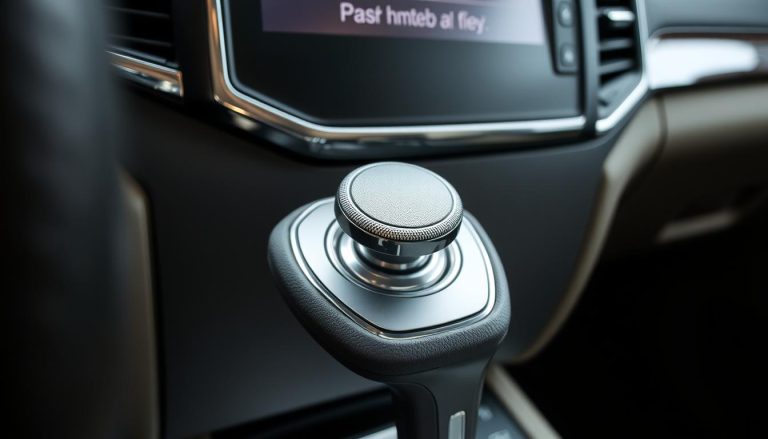For Jeep owners, maintaining the vehicle’s braking system is crucial for safety and performance. One of the key aspects of brake maintenance is replacing worn-out brake pads. The cost of this replacement can vary based on several factors.
Understanding the estimated costs and the factors that influence them can help Jeep owners plan and budget for this essential maintenance task. This article will provide an overview of the brake pad replacement process and the associated costs.
Key Takeaways
- Factors influencing brake pad replacement costs
- Estimated costs for different Jeep models
- Tips for reducing brake pad replacement expenses
- Importance of regular brake maintenance
- How to choose the right brake pads for your Jeep
Understanding Jeep Brake Systems
Jeep vehicles rely on sophisticated brake systems to provide safety and control on various terrains. These systems are designed to handle the demands of both on-road driving and off-road adventures, making them a critical component of the vehicle’s overall performance.
Common Brake Components in Jeep Vehicles
Jeep brake systems consist of several key components, including brake pads, rotors, calipers, and brake fluid. The brake pads are responsible for creating friction against the rotors to slow or stop the vehicle. Regular inspection of these components is essential to ensure optimal braking performance.
Signs Your Jeep Needs Brake Pad Replacement
Identifying when your Jeep needs brake pad replacement is crucial for maintaining safety on the road. Common signs include:
- Squealing or grinding noises when applying the brakes
- Vibrations or pulsations when braking
- A noticeable decrease in braking performance
Typical Lifespan of Jeep Brake Pads
The lifespan of Jeep brake pads can vary significantly based on driving habits, terrain, and model specifications. On average, brake pads in Jeep vehicles can last between 30,000 to 50,000 miles. However, this can be influenced by factors such as driving style and environmental conditions.
| Jeep Model | Average Brake Pad Lifespan |
|---|---|
| Wrangler | 35,000 – 45,000 miles |
| Cherokee | 30,000 – 40,000 miles |
| Grand Cherokee | 40,000 – 50,000 miles |
Jeep Brake Pad Replacement Cost
The cost of brake pad replacement for Jeep vehicles can vary significantly based on several factors, including the model, year, and type of brake pads used.
Understanding these costs is essential for Jeep owners to budget effectively for maintenance. The total cost of brake pad replacement includes both parts and labor.
Cost Breakdown: Parts vs. Labor
When replacing brake pads, the cost can be broken down into parts and labor. Typically, the parts cost includes the brake pads themselves, while labor costs cover the mechanic’s time and expertise.
Parts Costs: The cost of brake pads can vary widely depending on whether you choose Original Equipment Manufacturer (OEM) parts or aftermarket options.
Labor Costs: Labor costs are influenced by the complexity of the replacement process, the mechanic’s hourly rate, and the time required to complete the job.
Price Ranges for Popular Models
Different Jeep models have varying brake pad replacement costs. Here’s a general overview of what you might expect for some popular models:
| Jeep Model | Parts Cost | Labor Cost | Total Cost |
|---|---|---|---|
| Wrangler | $50-$150 | $100-$200 | $150-$350 |
| Cherokee | $40-$120 | $90-$180 | $130-$300 |
| Grand Cherokee | $60-$180 | $120-$250 | $180-$430 |
OEM vs. Aftermarket Brake Pad Options and Pricing
Jeep owners have the option to choose between OEM and aftermarket brake pads. OEM brake pads are made by the same manufacturer as the original parts, ensuring a precise fit and quality.
Aftermarket brake pads, on the other hand, are produced by third-party companies and can offer a range of prices and qualities.
While OEM brake pads are generally more expensive, they provide a guarantee of quality and compatibility. Aftermarket options can be more budget-friendly but may vary in quality.
Ultimately, the choice between OEM and aftermarket brake pads depends on your priorities regarding cost, quality, and performance.
Factors Affecting Replacement Costs
The cost of replacing brake pads in a Jeep can vary significantly based on several key factors. Understanding these factors can help Jeep owners anticipate and potentially mitigate the costs associated with brake pad replacement.
Jeep Model and Year Variations
Different Jeep models and model years can have a significant impact on the cost of brake pad replacement. For instance, the Wrangler, Cherokee, and Grand Cherokee have different brake systems and pad specifications, which can affect the price of parts and labor. Generally, more complex systems or those in higher-end models tend to be more expensive to repair.
Here are some key points to consider:
- Luxury or high-performance models may have more expensive brake components.
- Newer models might have more advanced brake systems, potentially increasing repair costs.
- Older models could have parts that are harder to find, potentially increasing labor costs.
Geographical Price Differences Across the US
Geographical location plays a crucial role in determining the cost of brake pad replacement. Urban areas, particularly those with a high cost of living, tend to have higher labor rates compared to rural areas. For example, replacing brake pads in a major city like New York or San Francisco could be more expensive than in smaller towns or cities.
Dealership vs. Independent Shop vs. Chain Repair Centers
The choice between using a dealership, an independent shop, or a chain repair center for brake pad replacement can also affect costs. Dealerships often charge more for labor, but they provide OEM parts and specialized knowledge for your specific Jeep model. Independent shops may offer more competitive pricing but ensure they are reputable and experienced with Jeep repairs. Chain repair centers can offer a balance between cost and convenience.
Consider the following when making your choice:
- Dealerships: Higher labor costs, OEM parts, and model-specific expertise.
- Independent Shops: Potentially lower costs, but verify their experience with Jeep models.
- Chain Repair Centers: Balance between cost and standardized service.
Additional Repairs That May Be Necessary
Sometimes, brake pad replacement is not the only repair needed. Other components like rotors or brake fluid systems might also require attention. If your Jeep’s rotors are warped or excessively worn, resurfacing or replacing them will add to the overall cost. Similarly, if the brake fluid is dirty or the system is leaking, additional repairs will be necessary.
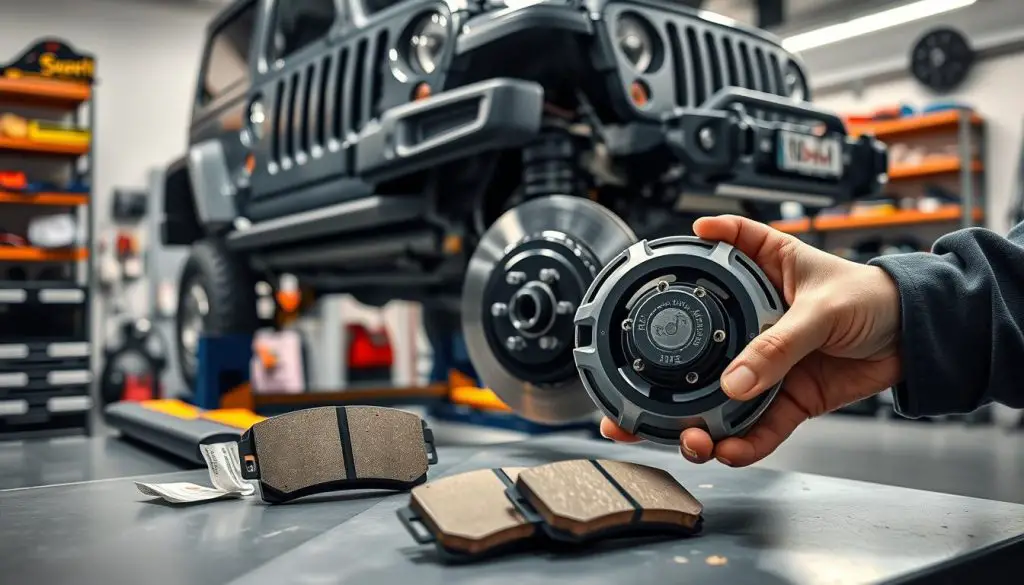
Being aware of these potential additional costs can help Jeep owners plan their maintenance budget more effectively. Regular inspections can identify issues early, potentially reducing the overall cost of repairs.
DIY vs. Professional Replacement
When it comes to replacing brake pads on your Jeep, you’re faced with a crucial decision: DIY or professional replacement? This choice depends on several factors, including your mechanical aptitude, the complexity of the job, and your budget.
Tools and Skills Required for DIY Replacement
To successfully replace your Jeep’s brake pads, you’ll need specific tools and a certain level of mechanical skill. The required tools typically include a lug wrench, a car jack, and C-clamps. Mechanical aptitude is crucial as you’ll need to understand how to disassemble the brake caliper and properly install new brake pads.
Familiarity with your Jeep’s brake system is also essential to avoid damaging other components during the replacement process.
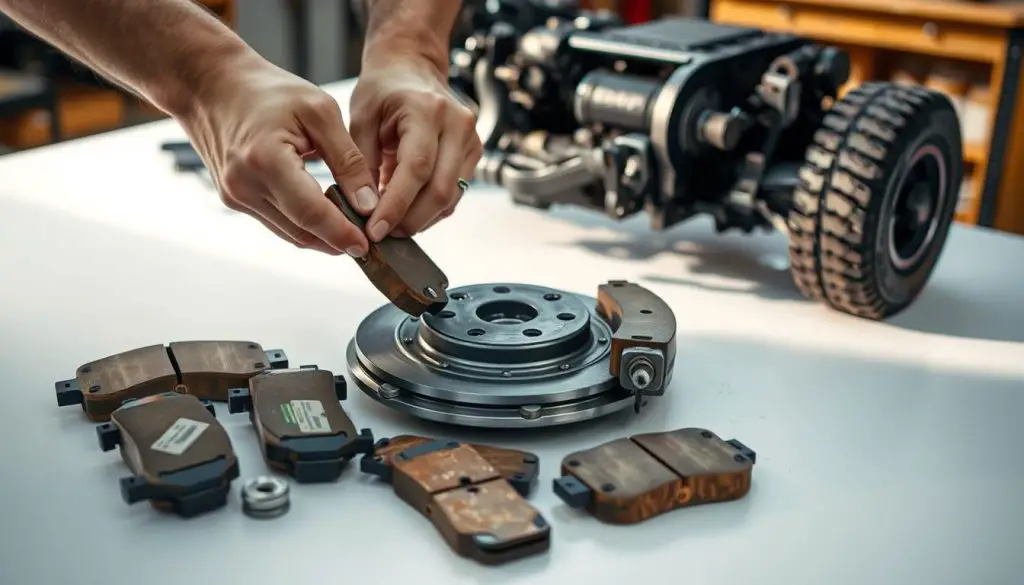
Cost Savings Analysis
One of the primary motivations for choosing a DIY brake pad replacement is cost savings. By doing the work yourself, you can save on labor costs, which can be a significant portion of the total expense. However, it’s essential to consider the cost of any additional tools or materials you might need to purchase.
A detailed cost comparison can help you decide whether DIY is the right choice for your budget.
Model-Specific Considerations
Different Jeep models have unique characteristics that can affect the complexity of brake pad replacement. For instance, the Wrangler’s design may require additional steps due to its rugged construction, while the Cherokee might have more straightforward access to the brake components.
Understanding these model-specific considerations is vital for a successful DIY replacement.
Warranty and Safety Considerations
When deciding between DIY and professional replacement, it’s crucial to consider the implications for your vehicle’s warranty and safety. Improperly installed brake pads can lead to safety issues and potentially void your warranty.
Professional mechanics ensure that the job is done correctly, maintaining your vehicle’s safety and warranty validity.
Conclusion
Understanding the costs associated with Jeep brake pad replacement is crucial for maintaining your vehicle’s braking performance. As discussed, factors such as the Jeep model, geographical location, and choice between OEM and aftermarket brake pads significantly influence the overall brake pad cost.
When considering Jeep brake pad replacement, it’s essential to weigh the pros and cons of DIY versus professional replacement. While DIY can offer cost savings, professional installation ensures warranty and safety standards are met.
Regular maintenance and timely replacement of brake pads are vital for ensuring your Jeep’s safety on the road. By staying informed about the costs and factors involved in brake pad replacement, you can make informed decisions and keep your vehicle in optimal condition.
FAQ
What is the average cost of replacing brake pads on a Jeep?
The average cost of replacing brake pads on a Jeep can range from 0 to 0 per axle, depending on the model, year, and type of brake pads used.
How often should I replace my Jeep’s brake pads?
The frequency of brake pad replacement depends on various factors, including driving habits, road conditions, and the type of brake pads used. Typically, brake pads need to be replaced every 30,000 to 50,000 miles.
What are the signs that my Jeep needs brake pad replacement?
Signs that your Jeep needs brake pad replacement include squealing or grinding noises when applying the brakes, vibration or pulsation when braking, and a spongy brake pedal.
Can I replace my Jeep’s brake pads myself?
Replacing brake pads on a Jeep can be a DIY-friendly task if you have the necessary tools and mechanical skills. However, it’s recommended to consult a professional mechanic if you’re unsure about the process.
What is the difference between OEM and aftermarket brake pads?
OEM (Original Equipment Manufacturer) brake pads are designed to meet the manufacturer’s specifications, while aftermarket brake pads are made by third-party companies and may offer varying levels of quality and performance.
How do I know if I need to replace my Jeep’s brake rotors along with the brake pads?
If your Jeep’s brake rotors are excessively worn, warped, or scored, it’s recommended to replace them along with the brake pads to ensure optimal braking performance and safety.
Can I use aftermarket brake pads on my Jeep if it’s still under warranty?
Using aftermarket brake pads on a Jeep that’s still under warranty may void the warranty, depending on the manufacturer’s policies. It’s recommended to consult the owner’s manual or contact the dealership for guidance.
Are there any additional repairs that may be necessary when replacing brake pads on a Jeep?
Yes, additional repairs may be necessary, such as replacing brake rotors, calipers, or brake fluid, depending on the condition of the brake system.
